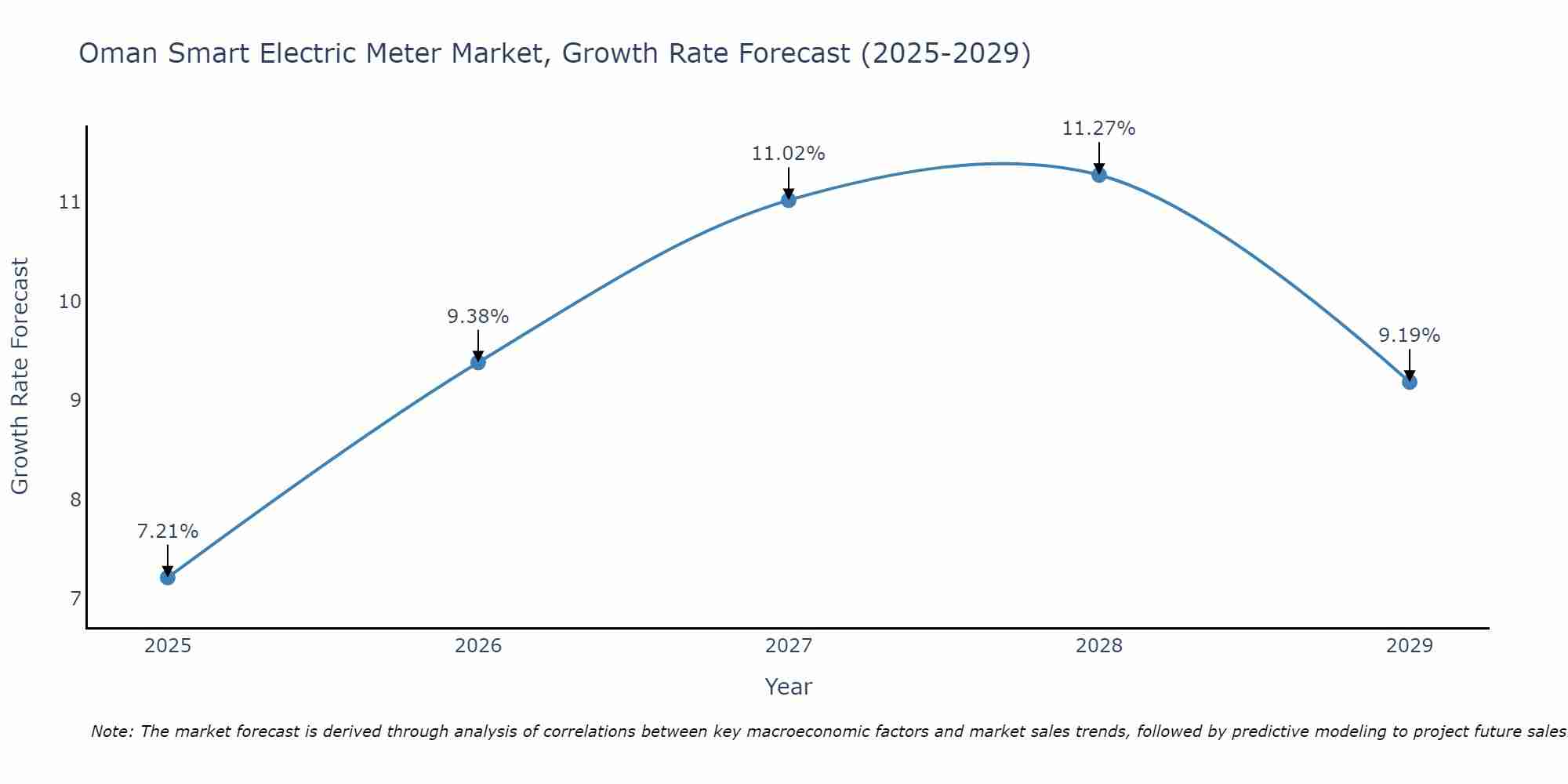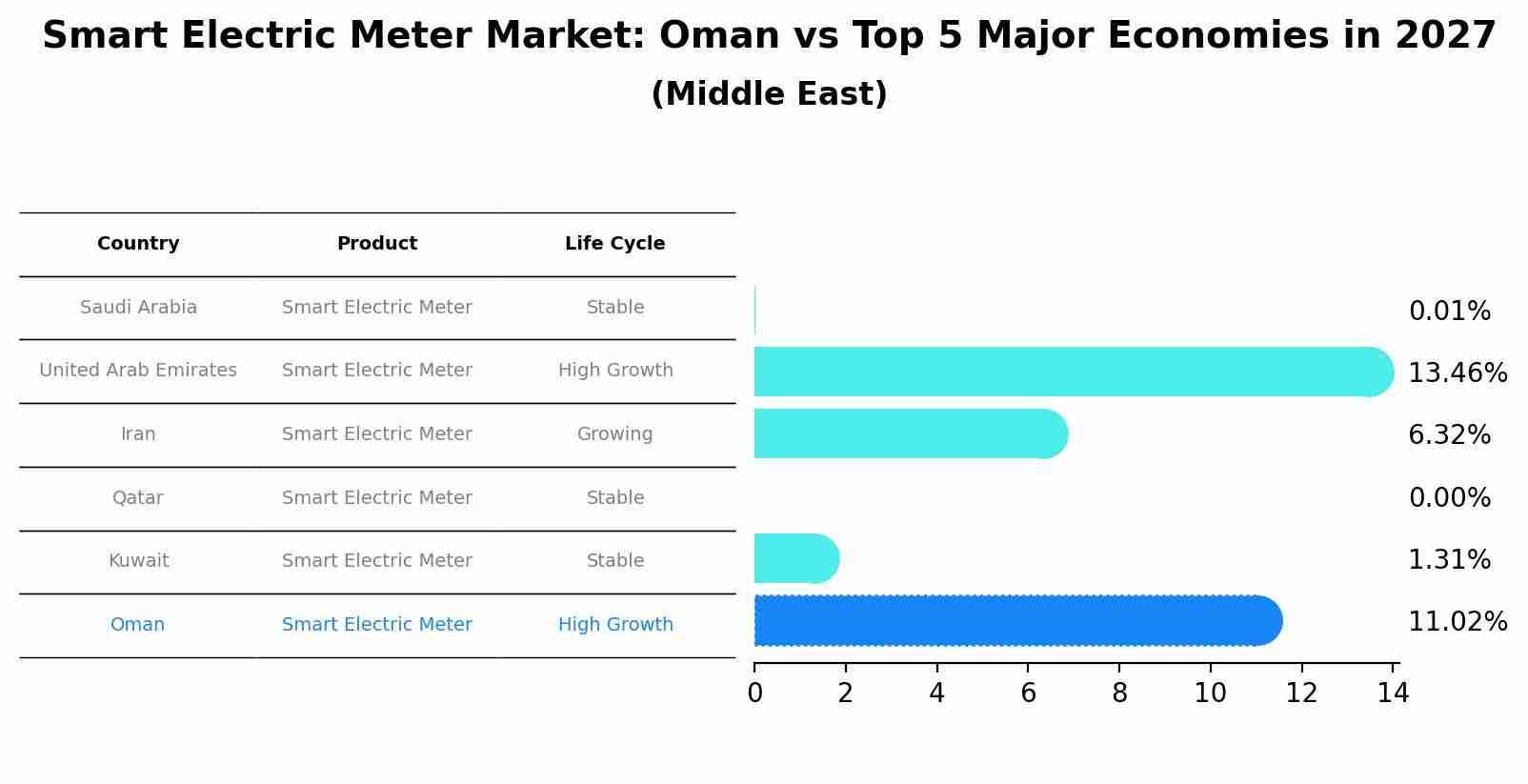Oman Smart Electric Meter Market Outlook | Trends, Size, Share, Companies, Growth, Analysis, COVID-19 IMPACT, Industry, Revenue, Value & Forecast
| Product Code: ETC369343 | Publication Date: Aug 2022 | Updated Date: Jul 2025 | Product Type: Market Research Report | |
| Publisher: 6Wresearch | Author: Summon Dutta | No. of Pages: 75 | No. of Figures: 35 | No. of Tables: 20 |
Oman Smart Electric Meter Market Size Growth Rate
The Oman Smart Electric Meter Market is projected to witness mixed growth rate patterns during 2025 to 2029. Growth accelerates to 11.27% in 2028, following an initial rate of 7.21%, before easing to 9.19% at the end of the period.

Smart Electric Meter Market: Oman vs Top 5 Major Economies in 2027 (Middle East)
The Smart Electric Meter market in Oman is projected to grow at a high growth rate of 11.02% by 2027, highlighting the country's increasing focus on advanced technologies within the Middle East region, where Saudi Arabia holds the dominant position, followed closely by United Arab Emirates, Iran, Qatar and Kuwait, shaping overall regional demand.

Oman Smart Electric Meter Market Synopsis
The Oman Smart Electric Meter Market is witnessing significant growth driven by increasing government initiatives towards modernizing the electricity infrastructure and promoting energy efficiency. Smart electric meters offer advantages such as real-time monitoring of electricity consumption, accurate billing, and remote meter reading, which are driving their adoption in residential, commercial, and industrial sectors. The market is also benefiting from the growing focus on smart cities and the need for advanced metering infrastructure. Key players in the Oman Smart Electric Meter Market include Landis+Gyr, Elster Group, and Itron Inc., among others. Factors such as the increasing demand for sustainable energy solutions, regulatory mandates for energy conservation, and the need for operational efficiency are expected to further propel the growth of the smart electric meter market in Oman.
Oman Smart Electric Meter Market Trends
The Oman Smart Electric Meter Market is experiencing a notable trend towards increased adoption of smart meters due to the government`s initiatives to modernize the energy infrastructure. Smart meters are being deployed to enhance energy efficiency, reduce operational costs, and enable real-time monitoring of electricity consumption. Key drivers include the push towards digitalization, rising demand for sustainable energy solutions, and the need for advanced metering infrastructure. Additionally, the integration of smart meters with IoT technology for remote monitoring and control is gaining traction in the market. Companies are focusing on developing innovative solutions to meet the growing demand for smart electric meters in Oman, creating opportunities for market growth and technological advancements in the energy sector.
Oman Smart Electric Meter Market Challenges
In the Oman Smart Electric Meter Market, several challenges are faced, including initial high implementation costs, resistance from consumers due to privacy concerns, lack of skilled workforce for maintenance and data analysis, interoperability issues among different metering systems, and cybersecurity threats. The high upfront costs associated with deploying smart meters can be a barrier for utilities looking to upgrade their infrastructure. Additionally, concerns about data privacy and security can lead to reluctance from consumers to adopt smart meters. The shortage of skilled professionals proficient in managing and analyzing the vast amount of data generated by smart meters can hinder the efficient operation of the system. Interoperability challenges between various metering systems can also complicate integration efforts, while the increasing cybersecurity risks pose a threat to the overall reliability and security of smart meter networks.
Oman Smart Electric Meter Market Investment Opportunities
The Oman Smart Electric Meter Market presents promising investment opportunities due to the government`s push for modernizing the electricity infrastructure. With a focus on energy efficiency and sustainability, there is a growing demand for smart meters to enable real-time monitoring and management of electricity consumption. Investors can explore opportunities in supplying smart metering solutions, software development for data analytics and automation, and offering installation and maintenance services. Additionally, partnerships with utility companies and government entities for large-scale smart meter deployment projects can be lucrative. As Oman strives towards digital transformation in its energy sector, investing in the Smart Electric Meter Market can provide long-term growth potential and contribute to the country`s sustainable development goals.
Jordan Agar Market Government Policies
The government of Oman has introduced several policies to promote the adoption of smart electric meters in the country. These policies include the implementation of the Automatic Meter Reading (AMR) system, which enables remote data collection and monitoring of electricity consumption. Additionally, the government has mandated the installation of smart meters in new residential and commercial buildings to improve energy efficiency and reduce wastage. Furthermore, Oman has set targets for increasing the penetration of smart meters in the electricity grid to enhance grid management and reduce operational costs. These policies aim to modernize the electricity infrastructure, promote sustainable energy practices, and empower consumers to better manage their energy usage.
Oman Smart Electric Meter Market Future Outlook
The future outlook for the Oman Smart Electric Meter Market appears promising, driven by factors such as increasing initiatives towards energy efficiency, government mandates for smart meter installations, and the rising adoption of smart grid technologies in the country. The implementation of smart meters offers advantages such as real-time monitoring of energy consumption, improved grid management, and enhanced customer engagement. With a growing focus on sustainable energy practices and the need to modernize the existing infrastructure, the demand for smart electric meters is expected to rise steadily in Oman. Key players in the market are likely to invest in technological advancements and strategic partnerships to capitalize on this trend and cater to the evolving needs of utility companies and consumers in the region.
Key Highlights of the Report:
- Oman Smart Electric Meter Market Outlook
- Market Size of Oman Smart Electric Meter Market, 2021
- Forecast of Oman Smart Electric Meter Market, 2031
- Historical Data and Forecast of Oman Smart Electric Meter Revenues & Volume for the Period 2018 - 2031
- Oman Smart Electric Meter Market Trend Evolution
- Oman Smart Electric Meter Market Drivers and Challenges
- Oman Smart Electric Meter Price Trends
- Oman Smart Electric Meter Porter's Five Forces
- Oman Smart Electric Meter Industry Life Cycle
- Historical Data and Forecast of Oman Smart Electric Meter Market Revenues & Volume By Phase for the Period 2018 - 2031
- Historical Data and Forecast of Oman Smart Electric Meter Market Revenues & Volume By Single for the Period 2018 - 2031
- Historical Data and Forecast of Oman Smart Electric Meter Market Revenues & Volume By Three for the Period 2018 - 2031
- Historical Data and Forecast of Oman Smart Electric Meter Market Revenues & Volume By Communication Technology Type for the Period 2018 - 2031
- Historical Data and Forecast of Oman Smart Electric Meter Market Revenues & Volume By Power Line Communication (PLC) for the Period 2018 - 2031
- Historical Data and Forecast of Oman Smart Electric Meter Market Revenues & Volume By Radio Frequency (RF) for the Period 2018 - 2031
- Historical Data and Forecast of Oman Smart Electric Meter Market Revenues & Volume By Cellular for the Period 2018 - 2031
- Historical Data and Forecast of Oman Smart Electric Meter Market Revenues & Volume By End-Users for the Period 2018 - 2031
- Historical Data and Forecast of Oman Smart Electric Meter Market Revenues & Volume By Industrial for the Period 2018 - 2031
- Historical Data and Forecast of Oman Smart Electric Meter Market Revenues & Volume By Commercial for the Period 2018 - 2031
- Historical Data and Forecast of Oman Smart Electric Meter Market Revenues & Volume By Residential for the Period 2018 - 2031
- Oman Smart Electric Meter Import Export Trade Statistics
- Market Opportunity Assessment By Phase
- Market Opportunity Assessment By Communication Technology Type
- Market Opportunity Assessment By End-Users
- Oman Smart Electric Meter Top Companies Market Share
- Oman Smart Electric Meter Competitive Benchmarking By Technical and Operational Parameters
- Oman Smart Electric Meter Company Profiles
- Oman Smart Electric Meter Key Strategic Recommendations
Frequently Asked Questions About the Market Study (FAQs):
- Single User License$ 1,995
- Department License$ 2,400
- Site License$ 3,120
- Global License$ 3,795
Search
Thought Leadership and Analyst Meet
Our Clients
Related Reports
- Canada Oil and Gas Market (2026-2032) | Share, Segmentation, Value, Industry, Trends, Forecast, Analysis, Size & Revenue, Growth, Competitive Landscape, Outlook, Companies
- Germany Breakfast Food Market (2026-2032) | Industry, Share, Growth, Size, Companies, Value, Analysis, Revenue, Trends, Forecast & Outlook
- Australia Briquette Market (2025-2031) | Growth, Size, Revenue, Forecast, Analysis, Trends, Value, Share, Industry & Companies
- Vietnam System Integrator Market (2025-2031) | Size, Companies, Analysis, Industry, Value, Forecast, Growth, Trends, Revenue & Share
- ASEAN and Thailand Brain Health Supplements Market (2025-2031) | Strategy, Consumer Insights, Analysis, Investment Trends, Opportunities, Growth, Size, Share, Industry, Revenue, Segments, Value, Segmentation, Supply, Forecast, Restraints, Outlook, Competition, Drivers, Trends, Demand, Pricing Analysis, Competitive, Strategic Insights, Companies, Challenges
- ASEAN Bearings Market (2025-2031) | Strategy, Consumer Insights, Analysis, Investment Trends, Opportunities, Growth, Size, Share, Industry, Revenue, Segments, Value, Segmentation, Supply, Forecast, Restraints, Outlook, Competition, Drivers, Trends, Demand, Pricing Analysis, Competitive, Strategic Insights, Companies, Challenges
- Europe Flooring Market (2025-2031) | Outlook, Share, Industry, Trends, Forecast, Companies, Revenue, Size, Analysis, Growth & Value
- Saudi Arabia Manlift Market (2025-2031) | Outlook, Size, Growth, Trends, Companies, Industry, Revenue, Value, Share, Forecast & Analysis
- Uganda Excavator, Crane, and Wheel Loaders Market (2025-2031) | Strategy, Consumer Insights, Analysis, Investment Trends, Opportunities, Growth, Size, Share, Industry, Revenue, Segments, Value, Segmentation, Supply, Forecast, Restraints, Outlook, Competition, Drivers, Trends, Demand, Pricing Analysis, Competitive, Strategic Insights, Companies, Challenges
- Rwanda Excavator, Crane, and Wheel Loaders Market (2025-2031) | Strategy, Consumer Insights, Analysis, Investment Trends, Opportunities, Growth, Size, Share, Industry, Revenue, Segments, Value, Segmentation, Supply, Forecast, Restraints, Outlook, Competition, Drivers, Trends, Demand, Pricing Analysis, Competitive, Strategic Insights, Companies, Challenges
Industry Events and Analyst Meet
Whitepaper
- Middle East & Africa Commercial Security Market Click here to view more.
- Middle East & Africa Fire Safety Systems & Equipment Market Click here to view more.
- GCC Drone Market Click here to view more.
- Middle East Lighting Fixture Market Click here to view more.
- GCC Physical & Perimeter Security Market Click here to view more.
6WResearch In News
- Doha a strategic location for EV manufacturing hub: IPA Qatar
- Demand for luxury TVs surging in the GCC, says Samsung
- Empowering Growth: The Thriving Journey of Bangladesh’s Cable Industry
- Demand for luxury TVs surging in the GCC, says Samsung
- Video call with a traditional healer? Once unthinkable, it’s now common in South Africa
- Intelligent Buildings To Smooth GCC’s Path To Net Zero


















